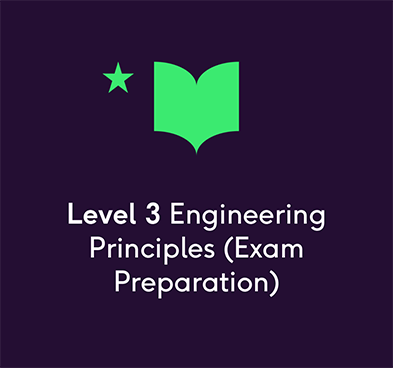 All new BTEC Level 3 Nationals qualifications in Engineering now include the mandatory unit, Engineering Principles (Unit 1), which is assessed by examination. This is a 120-hour unit, containing technical content from both Mechanical and Electrical Engineering disciplines.
All new BTEC Level 3 Nationals qualifications in Engineering now include the mandatory unit, Engineering Principles (Unit 1), which is assessed by examination. This is a 120-hour unit, containing technical content from both Mechanical and Electrical Engineering disciplines.
Due to the nature of this unit, it is likely that it will be challenging for Schools and Colleges to deliver and may also be difficult for students to develop the knowledge and understanding required to excel in the exam.
In this article we will explore some alternative approaches to the delivery of this unit, with a view to enabling students to achieve their full potential.
It is important to note that performance in this unit will affect students’ overall grades, and poor performance may even prevent some students from achieving a positive outcome for the qualification. For this reason, it is necessary to ensure that students are given every opportunity to gain the knowledge and understanding required to do their best in the exam.
Unit 1 Engineering Principles - Examination Opportunities
Students have up to two opportunities to sit the exam for this unit. The first is at the end of January and the second is at the end of June. A decision will need to be made prior to curriculum development, whether or not to enter students into the January exam, as this will influence how the unit is delivered. Doing so will give students two opportunities to attempt the assessment, but may not allow sufficient time for all of the unit content to be covered beforehand (approximately 120 hours of content).
It is likely to be of benefit to the students if they are able to sit both the January and June exams. A successful outcome in January would alleviate some pressure and an unsuccessful outcome would not have as much of a detrimental impact on the learner. They would also gain additional insight into their own strengths and weaknesses during this process, before the second exam in June.
One option then is to be selective over the content delivered in the first half of the academic year. Having reviewed the Sample Assessment Materials available on the Pearson website (here) it is possible to identify some potential ‘easy wins’. For example, there will almost certainly be a question on simply supported beams and also a resistor network question!
 Alternatively, Schools and Colleges could benefit from using the Engineers Academy® Level 3 ND Engineering Principles online course. This has been built with preparation for the exam in mind and every element of the specification has been covered in detail. Students could be encouraged to do two or three additional hours each week on the online Study Platform and this would enable them to cover all of the content in preparation for the first exam period.
Alternatively, Schools and Colleges could benefit from using the Engineers Academy® Level 3 ND Engineering Principles online course. This has been built with preparation for the exam in mind and every element of the specification has been covered in detail. Students could be encouraged to do two or three additional hours each week on the online Study Platform and this would enable them to cover all of the content in preparation for the first exam period.
>> Level 3 ND Engineering Principles (Exam Preparation and Revision) <<
BTEC Engineering Principles - Unit Content
The BTEC Level 3 Engineering Principles unit contains Mechanical and Electrical / Electronic Engineering content, as well as a substantial amount of Mathematics. Most Engineering teachers will have a specialism in either Mechanical Engineering or Electrical Engineering, so it may be difficult to ensure that all of the content is delivered with the same rigour.
Ideally three teachers will deliver the unit, a Maths specialist, a Mechanical specialist and an Electrical specialist. However, this approach also has a downside because opportunities to embed the mathematics into contextual questions may be lost. The major advantage of this approach to delivery is that it would prevent the teachers own biases from being projected on to the students. It is important to enable learners to explore all aspects of Engineering for themselves, especially if they are seeking future employment in the sector.
An alternative mode of delivery would be to have a teacher with a particular specialism teach the unit, as well as making full use of the Engineers Academy course for their non-specialist disciplines. This would enable students to study all aspects of Engineering, with online tutorials delivered by specialists in each discipline.
Another option is for students to complete all of their study and preparation for the unit using the Engineers Academy resources. This would enable a non-engineering specialist to facilitate every session with the learners, rather than carrying out the unit delivery directly.
>> Level 3 ND Engineering Principles (Exam Preparation and Revision) <<
Differentiation in Engineering Principles Content Delivery
As teachers will understand, the ideal is to provide teaching resources that are tailored to the individual needs of each student. Some students may require additional support to grasp basic concepts, whereas others will be able to work independently, at a very high level, providing there are given the opportunity to do so.
The same will be true for this unit, where some students may be working at a borderline pass level, whilst others are working at a high-end distinction level. It can be difficult for teachers to pitch lessons at a level which will be suitably challenging for all learners, but this is necessary to ensure they all receive the grades that they are capable of.
Once again, I recommend making use of the Engineers Academy Engineering Principles online course, to address this issue.
Picture the scene: a mixed ability class of 20 learners are all studying this unit together. As the students arrive to a lesson they are instructed to log on to the Engineers Academy study platform. The teacher directs the students to lessons on the topic of ‘calculating resultant forces’.
The students who are already comfortable applying trigonometry watch the video tutorial for the resolution of three force systems and begin working through the practice questions. The questions are structured such that the students are able to check if they are progressing correctly. For example, they will calculate the sum of the x components and input their answer (receiving notification that it is correct), before moving on to calculating the sum of the y components. If they make mistakes or are unsure of the next step then they refer back to the video tutorials, or go back to the lesson on ‘calculating the resultant of two forces’. They are able to continue working independently, irrespective of their ability.
However, some students are not comfortable applying trigonometry. They begin watching the tutorials for ‘calculating the resultant of two forces’, which direct them back to earlier lessons on Pythagoras' theorem and trigonometry. They spend the lesson revisiting these topics and by the end of the session have been able to use trigonometry to find the x and y components of a single force.
In the session described above, all students will have achieved their potential, working at very different levels from one another. Not only that, they will all have the opportunity (and should be encouraged) to continue working on this topic before the next session, as they will have unlimited access to the online lessons.
As an additional benefit, the teacher will be able to review the scores from the practice questions, for all of the students in the group and so will have a good understand of how every learner is progressing.
Engineers Academy Sample Lessons and Demos
If you would like to book a demo of the Engineers Academy study platform, or would like to discuss the use of our online courses, then please contact us below:
Alternatively, please register for our Free Sample Lessons, to experience our courses for yourself:
A Message for Schools and Colleges Delivering BTEC Level 3 Engineering Qualifications:
